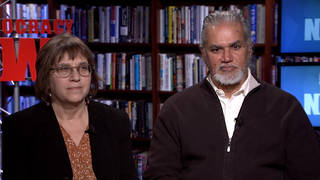HeadlinesApril 27, 2015
Nepal: Toll from Worst Earthquake in 80 Years Nears 4,000
At least 3,700 people have been confirmed dead after Saturday’s devastating 7.8-magnitude earthquake in Nepal. More than 6,500 people have been injured, and the death toll has continued to rise sharply, with the full extent of the damage still largely unknown. Dozens of people are also reported dead in neighboring China and India. The earthquake was the worst to hit Nepal in more than 80 years. It opened massive rifts in roads and destroyed historic structures, including the 19th century Dharahara Tower in the capital Kathmandu, which was packed with sightseers when it collapsed. Driving rains have hit thousands who remain in the streets, afraid to go back inside amid intense and repeated aftershocks. The quake triggered avalanches on Mount Everest, where at least 18 climbers were killed, including three Americans. The aftershocks have delayed attempts by countries around the world to send aircraft, rescue personnel and other aid.
Yemen: Saudi-Led Coalition Resumes Airstrikes in Sana’a
In Yemen, the Saudi-led coalition has resumed airstrikes targeting Houthi rebels in the capital Sana’a after announcing it was shifting toward political negotiations. The strikes came amid fierce fighting in the southern city of Taiz between Houthi rebels and forces loyal to ousted Yemeni President Abdu Rabbu Mansour Hadi. At least 20 civilians were reportedly killed. On Friday, The United Nations said over 550 civilians have died in the violence over the past month, including 115 children.
Israel Launches Airstrike on Syrian Border
Israel has acknowledged launching an airstrike on its border with Syria after it says it saw militants carrying a bomb in the Israeli-occupied Golan Heights. Meanwhile, the United States has carried out three airstrikes targeting the self-proclaimed Islamic State in Syria, and 17 in Iraq.
Maryland: Freddie Gray to Be Laid to Rest
In Baltimore, Maryland, hundreds of people paid respects to Freddie Gray, the 25-year-old African-American man who died of neck injuries in police custody. Gray’s wake took place Sunday ahead of the funeral today. On Saturday, a peaceful protest of over 1,000 people later turned violent, when some protesters smashed windows and clashed with police. Police arrested at least 35 people and acknowledged “inadvertently detain[ing]” two journalists. A photo editor for Baltimore City Paper was beaten by police in an incident caught on video. Baltimore Police Commissioner Anthony Batts acknowledged police made mistakes when they detained Gray, who died last Sunday, a week after his arrest.
Anthony Batts: “We know he (Freddie Gray) was not buckled in the transportation wagon as he should have been. No excuses for that, period. We know our police employees failed to get him medical attention in a timely manner multiple times.”
Gray was apparently arrested after making eye contact with a lieutenant, then running away. Six officers involved in his arrest have been suspended with pay. His family has said his spine was “80 percent severed” at the neck.
New York: Police Kill Mentally Ill African-American Man
In New York City, police detectives have shot and killed an African-American man with schizophrenia in a housing complex for mentally ill people in Manhattan’s East Village. Unnamed police sources have said Felix David grabbed an officer’s radio and hit police in the head before they fatally shot him. No video of the shooting has so far emerged.
Burundi: 5 Killed amid Protests over President’s Re-election Bid
In the Central African nation of Burundi, police have fired tear gas and water cannon on protesters massing for a second day against the president’s decision to seek a third term. Authorities have banned protests related to the candidacy of President Pierre Nkurunziza, whose bid critics say violates constitutional term limits. At least five people were reported killed on Sunday, at least two of them shot dead by police.
Indonesia Poised to Execute 10 Prisoners for Drug Crimes
The United Nations has urged Indonesian President Joko Widodo to spare the lives of 10 prisoners facing execution for drug crimes. The prisoners, who come from Nigeria, Australia, Brazil, Ghana, the Philippines and Indonesia, have been given 72 hours’ notice, meaning their executions by firing squad appear to be imminent.
New York: Parents of 43 Missing Mexican Students March to U.N.
Parents and relatives of the 43 students missing in the Mexican state of Guerrero have marked seven months since their loved ones disappeared. Some of the parents and relatives converged on New York City after traveling across the United States in caravans. On Sunday, they marched to the United Nations, asking the U.N. to pressure Mexico to reopen the investigation into the students’ disappearance and calling for the U.S. to stop backing Mexico’s drug war under Plan Mérida. The Mexican government has said the students were attacked by municipal police acting under the corrupt mayor of Iguala, then turned over to drug gang members who killed and incinerated them. But Mexican news reports point to a role by federal authorities. María de Jesús Tlatempa Bello, mother of one of the missing students, spoke at Sunday’s march.
María de Jesús Tlatempa Bello: “We are here today marching, April 26, in support of the Ayotzinapa Normal School. I’m a mother who has a disappeared son. His name is José Eduardo Bartolo Tlatempa. My name is María de Jesús Tlatempa. And we’re here asking the support of all the American people, asking for them to stand in solidarity with us, as parents, because it’s the only way to demand our government help us find our children, and to pressure our government, Mexican President Enrique Peña Nieto, and all of our leaders, because they are all involved in the forced disappearance of our children.”
Uruguay: Former Guantánamo Prisoners Protest Outside U.S. Embassy
In Uruguay, four former Guantánamo prisoners have been protesting for days in front of the U.S. Embassy, demanding U.S. financial and housing support. The men were imprisoned at Guantánamo for 12 years before being released and resettled in Uruguay. They have vowed to continue marching and sleeping outside the embassy until the U.S. ambassador meets with them.
Japan: Man Admits Flying Radioactive Drone as Anti-Nuclear Protest
In Japan, a man has turned himself in to police, admitting he flew a drone containing low levels of radioactive material onto the roof of the prime minister’s office. Yasuo Yamamoto has said he equipped the drone with sand from Fukushima, site of the 2011 nuclear meltdown, as a protest against Prime Minister Shinzo Abe’s push to restart nuclear plants.
Pakistan: Leading Activist Sabeen Mahmud Shot Dead
In Pakistan, a leading human rights activist has been shot dead in Karachi. Sabeen Mahmud was the director of the Second Floor, a progressive community space. She was shot while leaving the venue after hosting a talk on the disappearances of activists in Balochistan, where the Pakistani army has been waging a decade-long campaign. The event was initially set to take place in Lahore, but was reportedly canceled and relocated following threats from Pakistan’s intelligence services.
For-Profit Corinthian Colleges Shuts Remaining 28 Campuses
And in the United States, the for-profit Corinthian Colleges system has shut down all of its remaining 28 campuses, interrupting the education of 16,000 current students in what’s believed to be the largest higher education shutdown in U.S. history. Earlier this month, the U.S. Department of Education unveiled a $30 million fine against the company for misrepresenting job placement rates.
Most popular
- 1
- 2
- 3
- 4
Non-commercial news needs your support
Please do your part today.











Media Options